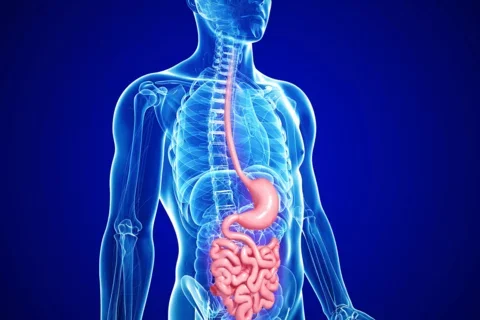Gastroparesis Symptoms, Treatment, and Causes
Medical Expert Interview

In this article:
- Gastroparesis Definition
- Gastroparesis Causes
- Gastroparesis Symptoms
- Gastroparesis Diagnosis
- Gastroparesis Treatment
Meet Dr. Craig Gluckman
“Most people don’t realize that the GI system is the second biggest organ in the human body, second only to the skin.”
Originally from South Africa, Dr. Gluckman knew at a young age that he wanted to become a doctor: “During high school I was part of the first aid team for sports matches, splinting sore arms, treating scrapes and bruises,” he recalls. “And that inspired a passion for helping people.”
From there he went directly into medical school, earning his degree from the University of the Witwatersrand in Johannesburg. Initially he focused on internal medicine, but after relocating to the United States, decided to pursue a fellowship in gastroenterology.

“As a gastroenterologist, you get exposed to so much of the human body,” he explains. “There's a huge variety of diseases and pathologies that gastroenterologists encounter. No two days—or two patients—are ever the same.”
Once he completed his internal medicine residency and fellowship at Mount Sinai Beth Israel in New York City, he chose to continue his training with an additional fellowship at the University of Pennsylvania where he concentrated on esophageal and motility disorders. “Motility is basically how the GI system works,” he explains. “Or doesn’t work…”
And now his career as a GI motility specialist at UCLA means he frequently sees patients that other doctors haven’t been able to help: “I get to treat the more complicated cases, those that are less straightforward for many reasons. I’m the doctor a patient would see for a second or third opinion.”
Working for UCLA has also provided Dr. Gluckman with some interesting educational experiences. “I did this talk on the different types of belching that actually went viral,” he shares. “Now I get patients referred to me from all over the country and even all over the world, just based on this webinar.”
Learn More About What It's Like to Be a Gastroenterologist
What Is Gastroparesis?
Gastroparesis is a medical condition that affects the stomach's ability to properly empty its contents into the small intestine. This condition occurs when the muscles in the stomach—which are responsible for pushing food through the digestive tract—become impaired or weakened. As a result, food stays in the stomach for a longer time than normal, leading to various digestive symptoms.
Dr. Gluckman, however, isn’t partial to the technical term for this condition: “The name ‘gastroparesis’ is a misnomer,” he maintains. “I prefer the term ‘delayed gastric emptying’ because the stomach is not paralyzed. It’s just pushing food more slowly.”
What Are the Stages of Gastroparesis?
According to Dr. Gluckman, there are three stages of gastroparesis: “There's mild, moderate, and severe. And that's based on the severity of the symptoms, the degree of slowness that the stomach empties, and some of the complications a patient might have.”
- Mild Gastroparesis: In this stage, the stomach may empty slowly, but the symptoms are relatively mild and may not significantly impact daily life.
- Moderate Gastroparesis: The emptying of the stomach is further delayed, and symptoms become more noticeable, affecting eating patterns and causing discomfort.
- Severe Gastroparesis: The stomach's emptying is significantly impaired, and symptoms become more severe, leading to significant weight loss, malnutrition, and a substantial impact on quality of life.
“It would be considered more severe if someone is dehydrated and unable to eat versus somebody with a milder form of the disease who just has occasional symptoms,” Dr. Gluckman explains.
Does Gastroparesis Go Away? Can It Be Cured?
Gastroparesis is a chronic condition, and in most cases, it does not go away or have a definitive cure. However, its symptoms can be managed, and the progression of the condition can be slowed with appropriate treatment. The goal of treatment is to alleviate symptoms, improve stomach emptying, and enhance the patient's quality of life.
“Of course, there are exceptions,” Dr. Gluckman is quick to note. “For instance, if a patient is on a medication which is associated with gastroparesis, they can stop or change medications and their gastroparesis will likely go away.”
Gastroparesis Life Expectancy - Is Gastroparesis Fatal?
“It should never affect a person's life expectancy, and it should never be fatal,” Dr. Gluckman insists.
However, if left unmanaged, he admits that severe gastroparesis can lead to complications that may be serious or even life-threatening: “If somebody leaves the condition totally untreated for years and years, there is that potential that they could become severely dehydrated and malnourished.”
Still, he considers this outcome quite improbable: “In theory, somebody could die from gastroparesis but it’s very unlikely they would get that severely ill without seeking medical care.”
What Causes Gastroparesis?

The exact cause of gastroparesis is not always clear, and it can result from a variety of factors. Some common causes and risk factors include:
Diabetes: Gastroparesis is often linked to diabetes, especially when blood sugar levels are poorly controlled. Why? High blood glucose levels can damage the vagus nerve, which controls the muscles responsible for stomach emptying.
Infections: Viral infections, such as herpes simplex or Epstein-Barr virus, can sometimes trigger the condition. Some instances have even been linked to the recent pandemic: “We’ve started seeing some cases of post-Covid gastroparesis,” Dr. Gluckman reveals.
Surgery: Certain abdominal surgeries, such as those involving the stomach or esophagus, can increase the risk of developing gastroparesis by damaging the vagus nerve.
Medications: Some medications, such as opioid pain medicines and anticholinergic drugs, can slow down stomach emptying. “With these newer weight loss medicines—like semaglutide—many patients are developing gastroparesis as a side effect,” Dr. Gluckman also notes. “We think part of the way people lose weight on these drugs is they feel very full. Because if the food doesn't leave their stomach they don't want to eat.”
Neurological Disorders: Conditions like Parkinson's disease and multiple sclerosis can affect the nerves that control stomach motility.
Autoimmune Diseases: Certain autoimmune conditions can affect the nerves and muscles in the gastrointestinal tract.
Idiopathic: In some cases, the exact cause of gastroparesis remains unknown, and it is referred to as idiopathic gastroparesis. And this is the largest group, according to Dr. Gluckman.
Is Gastroparesis Hereditary?
“There's no obvious hereditary link,” says Dr. Gluckman. “However, you might have a special patient—like a diabetic who's on opioid pain medicines or also has Parkinson’s disease—that might have two or three reasons for having gastroparesis, which would obviously put them more at risk. So it’s just a matter of managing those individual conditions as best you can.”
What Are the Symptoms of Gastroparesis? What Does Gastroparesis Feel Like?
“The main symptoms are abdominal pain, bloating, nausea, vomiting, early satiety (which is feeling very full very quickly), and postprandial fullness (which is feeling fuller than you should after eating).”
Unintended weight loss is another common symptom due to reduced food intake and nutrient absorption. Dr. Gluckman elaborates: “Oftentimes a patient might eat breakfast and not want to eat lunch or dinner because they still feel full. Or they've eaten dinner, and the next morning they don't feel like eating breakfast because they still feel full from the meal the night before.”

How Is Gastroparesis Diagnosed? Is There a Gastroparesis Test?
The process of getting a gastroparesis diagnosis generally involves several steps, including ruling out other possible causes of the symptoms.
Medical History and Physical Examination: “Like everything in medicine, you want a good history and examination,” insists Dr. Gluckman. “That's the most important.” The doctor will ask about symptoms, medical history, and any underlying conditions, such as diabetes or neurological disorders. They will also perform a physical examination to look for potential causes of gastroparesis.
Upper Endoscopy: In this procedure, a thin, flexible tube with a camera is inserted through the mouth into the esophagus and stomach to examine the stomach lining and rule out other conditions that may mimic gastroparesis. “You want to make sure there's no mechanical obstruction where the stomach doesn't empty because there's a narrowing at the pylorus, which is the end of the stomach.”
Barium Swallowing Study: This diagnostic imaging test helps visualize the structure of the esophagus, stomach, and the first part of the small intestine (duodenum). After the patient consumes the barium sulfate, a series of X-ray images are taken at timed intervals to observe the movement of the barium through the digestive tract. “The barium swallowing study will make sure the barium does move from the stomach into the small bowel.”
Gastric Emptying Study: “If you establish that there’s no mechanical cause for the gastroparesis, the diagnostic test of choice is a gastric emptying test.” During the test, the patient will eat a meal containing a small amount of radioactive material, and then the rate at which their stomach empties the food into the small intestine will be monitored with the help of a special camera. “That’s how they work out how quickly or how slowly the stomach empties over a four-hour period,” Dr. Gluckman explains. “Patients with severe gastroparesis can still have a lot of the radioactive trace material in the stomach, even after four hours.”
What Is the Treatment for Gastroparesis?
“In terms of treatment, there's various options depending on the severity.”
Gastroparesis Diet Modification: This is the best place to start, according to Dr. Gluckman. “We do recommend a low fat and low fiber diet because we know that those foods pass through the stomach quicker than high fat and high fiber foods. And liquids pass through the stomach quicker than solids, so more severe cases might ingest more liquids than solids,” he explains. “We also encourage small, frequent meals. The patient might have a small breakfast, a snack, a small lunch, a snack, and a small dinner.”
Gastroparesis Medication: Various medications can help improve stomach motility and reduce symptoms of gastroparesis. “To treat the nausea and vomiting, we would recommend an antiemetic medication. And then we would consider some sort of promotility agent that will help push food through the stomach.” Metoclopramide, domperidone, or erythromycin (and the newest medicine prucalopride) are often prescribed to enhance stomach contractions and promote emptying.
Gastroparesis Surgery: “If we think the problem is at the pylorus (the end of the stomach), during an endoscopy, we can inject Botox into that area,” says Dr. Gluckman. “That will relax the pyloric sphincter, allowing it to open and food to empty more quickly from the stomach.” If that proves successful, then a pyloroplasty (widening the opening between the stomach and small intestine) might be performed: “If the patients see improvement with the Botox injection, we can do surgery and actually cut the pyloric muscle, so the food will flow more freely into the small bowel, though this treatment would be reserved for more severe cases.”
Gastric Pacemaker: “Just like in cardiology, where a cardiologist might put in a cardiac pacemaker, for very severe cases of gastroparesis a surgeon might implant a gastric pacemaker onto the surface of the stomach,” Dr. Gluckman explains. “This can help regulate the peristalsis (the contraction and relaxation of muscles that moves food from the stomach to the intestines).”
Enteral Nutrition: This treatment is recommended when oral food intake is insufficient. “Some patients may also require a feeding tube to get adequate nutrition. In cases of gastroparesis, the tube would be inserted into the jejunum (the small bowel), as opposed to the stomach. That’s the difference between a J tube and a G tube.”
Learn More About Enteral Nutrition
To determine which treatment or treatments might work best, Dr. Gluckman believes a multi-disciplinary approach is key: “An internist, a gastroenterologist, and a dietician should work together to address risk factors and optimize patient care,” he insists. “And ideally, the patient would see a GI motility specialist so they can be assessed for other conditions which often accompany gastroparesis. For instance, a patient with Parkinson’s may also have constipation and bacterial overgrowth.”

Gastroparesis Awareness Month
In 2016, August was designated Gastroparesis Awareness Month by the International Foundation for Gastrointestinal Disorders (I.F.F.G.D.), an organization committed to supporting the gastroparesis community through increased awareness, educational efforts, and research promotion. The primary aim is to provide information about the symptoms, causes, and available treatments for this condition. Unfortunately, the symptoms of gastroparesis are often mistaken for other conditions, leading to delays in proper medical intervention. Those who are affected by gastroparesis—approximately 10 men and 40 women for every 100,000 people—have to deal with a range of gastrointestinal challenges, which can potentially restrict their physical capabilities and impact their overall quality of life.



